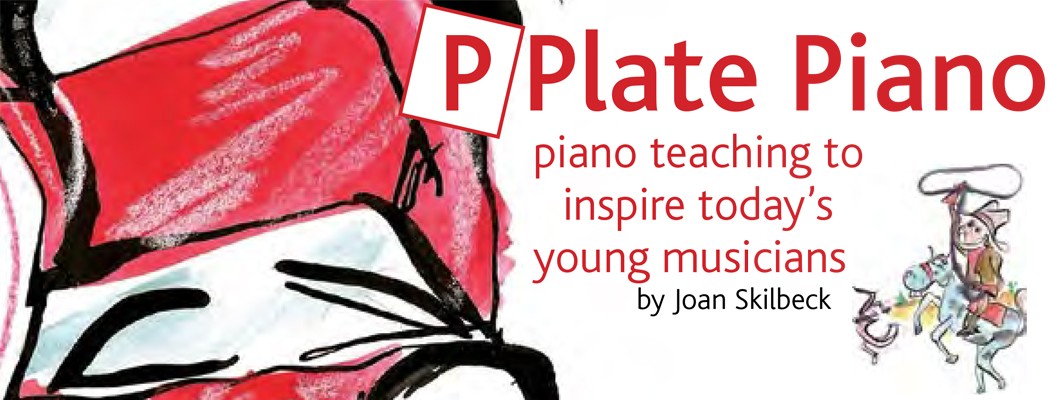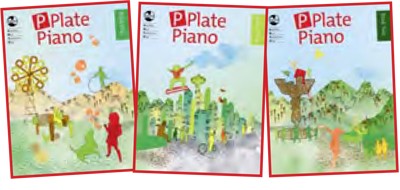Mark Griffiths says that the introduction of the AMEB’s P Plate Piano into his teaching program has helped inspire his students to want to learn. “The pieces sound so good that the children really want to play them. They are motivated to practise and are inspired to keep studying the piano,” Mark said.
I put this down to the P Plate Piano program being developed for today’s students. So many of the children I teach are looking for more instant gratification and like to take some control in their learning. With P Plate Piano, because they recognise and relate to the sounds and rhythms of the repertoire, they are determined to perform the pieces. They are also encouraged to make creative decisions about how they will play the pieces and this allows them to take ownership of the music.
P Plate Piano is a series of three books that take a beginner pianist from their first tutor to AMEB preliminary piano level. The music has been selected by respected music educator Elissa Milne, with an emphasis on encouraging performance and creativity. Learning is supported through a dedicated P Plate Piano website with a range of teaching resources and stimulating activities for students. A Hall of Fame showcasing student performances via YouTube and an online student diary are features of the website.
Mark Griffiths has been teaching piano professionally for more than 15 years. He has his own studio and directs the Young Beginner Keyboard/Piano programs and teaches Piano and Early Childhood Music at Queensland’s Griffith University Young Conservatorium. His students range from the very young, through to students with special needs and diploma students. Mark has also been an AMEB examiner for the past four years and is one of the first examiners to assess candidates completing the P Plate Piano program.
Mark uses the P Plate Piano program in conjunction with the more traditional tutors and a variety of other music so that his young students are provided with a range of musical experience and inspiration. He always involves them in the selection of repertoire so that the chosen program has a pedagogical basis as well as appeal for the child.
It’s so important to motivate students to keep going and I have learned over the years that offering them music that they want to play is crucial to this.
“The range of styles and techniques covered in the P Plate Piano pieces has made it easy for me to guide the children’s selection so that we can focus on particular technical aspects that need to be developed through learning pieces they want to perform. The program makes a huge contribution to the repertoire available for students who are no longer beginners but are not yet ready to prepare for Preliminary level exams,” Mark said.
“The pictures, stories and activities that come with each piece are great”, Mark added. “They really engage the student’s imagination and there is so much to build my teaching on. I particularly like the pictures of the keyboard and fingers for each hand that are also good support for parents who are supervising practice at home,” he said. “The books are uncluttered, inspirational and even little children, who can’t necessarily read yet, can read the pictures and keyboard geography.” Mark is using the P Plate Piano repertoire as part of his teaching program with six-year-old Scarlett and her eight-year-old brother Harry. “Scarlett is working on The Sad Farmer in Book 1 at the moment,” Mark said. “In this piece she’s experimenting with using flats and sharps and exploring the major and minor tonal qualities that can be created by interchanging them. It’s a great way to bring this theory to life and at the same time Scarlett is able to make her own decisions about how she wants the piece to sound in performance.”
“Harry is preparing Tittle Tattle from Book 2 for the end-of-term concert,” Mark added. “This has been an important piece for helping him develop dynamic control in each hand. The title of the piece already describes chattering voices so it’s easy to talk about which voice is leading the conversation and needs to brought out in this context, rather than just telling him to make the left hand softer at bar six. Scarlett and Harry are very much looking forward to learning a duet from the P Plate Piano repertoire and performing it in a concert later in the year.”
The P Plate Piano program is also proving to be a great hit with the parents and Mark emphasises how important parent involvement is to student learning. “As a teacher, I spend a great deal of time building the parent-student-teacher triangle. This is essential to motivating the children and developing their self discipline to practise. I believe that when parents enjoy listening to the music and are enthusiastic about their child’s playing, the child is more likely to enjoy making music and continue with their study. I’ve found that with P Plate Piano, the parents love the pieces and there is a lot of scope for them to be involved in the music making. Their enthusiasm rubs off on the children.”
Mark noted that the dedicated P Plate Piano website is a terrific support to the students, parents and teachers and an important part of using today’s technologies to enhance teaching and learning. “When I told Scarlett that she could keep an online diary as part of the program, she was as excited about this as she was about performing her pieces and couldn’t wait to go onto the website and enter her ‘secret password’,” he said. “Recording my students’ performances has also become an important part of my teaching and the idea of watching other students performing the same pieces in the P Plate Piano Hall of Fame is a great way to challenge and motivate the children.”
The option of a non-graded assessment is available on completion of each P Plate Piano book to introduce the exam experience to students. Each student receives a written report from the examiner and a certificate at the end of the assessment. A P Plate Piano licence is awarded on completion of the assessment for Book 3.
Through being a P Plate Piano examiner, Mark has been amazed at how much the children enjoy the assessment experience. Children’s comments such as, ‘That was so cool and I even got a certificate at the end,’ have challenged his own thinking about students and exams.
I’ve come to realise that enjoyment is the most important part of performance and that’s what the students seem to gain from their P Plate Piano assessment experience
“Reports and marks are really only important to the teachers and parents. In the P Plate Piano setting, I focus on making each student’s exam a positive experience. The reports I write are for teachers to encourage their students in future lessons, reinforcing what has hopefully been a great experience for the children.”
“I’ve noticed that the children coming into their second P Plate Piano exam greet me like an old friend,” Mark said. “They are much more relaxed and confident than they were for their first exam.” Mark would like to see teachers become more relaxed about the P Plate Piano exams too. “The idea is for the students to have fun performing. It’s not about being 100% perfect and it’s certainly not a reflection on the quality of the teaching if total perfection isn’t achieved,” Mark emphasised. “It would be great to see more teachers and parents come into the exam room with the children, and even be involved in the performance, so that together we can create a supportive environment for their early performances where feedback is provided,” he added.
Knowing Elissa Milne is behind the P Plate Piano program is a great selling point for Mark. “Elissa’s enthusiasm is infectious. Her workshops and the online tutorials on the P Plate Piano website where she demonstrates the pieces and offers suggestions and tips for teaching them add a great deal of value to the program – for both teachers and parents,” he said. “Elissa also emphasises the importance of not pushing our students too quickly but rather enjoying them and their learning – that’s a great philosophy. I agree that it is our responsibility to let the child guide the speed of learning, especially at the early stages, and for us to broaden their experience,” Mark added. “P Plate Piano enables this practice in every way.”
Mark believes that the P Plate Piano program demonstrates the AMEB’s recognition of today’s teaching and learning environment, particularly for young students. “A program where young children can enjoy making music and where their parents and teachers experience positive outcomes is a good thing,” he said. “The program relates to the children of today, allows them to be actively involved in their learning and offers a great range of flexible repertoire for them to enjoy performing from a young age. The positive experience that comes through the exams is also an important part of the program. P Plate Piano contributes a broad early learning experience in a very appropriate framework that is sure to help encourage students to continue their study and enjoyment of music through their life. For me, that’s what teaching is all about.”

